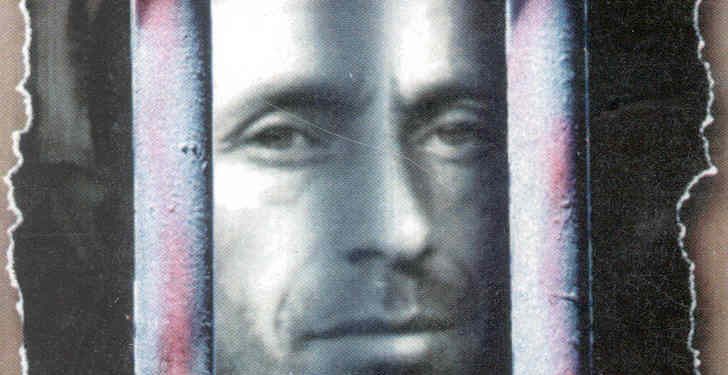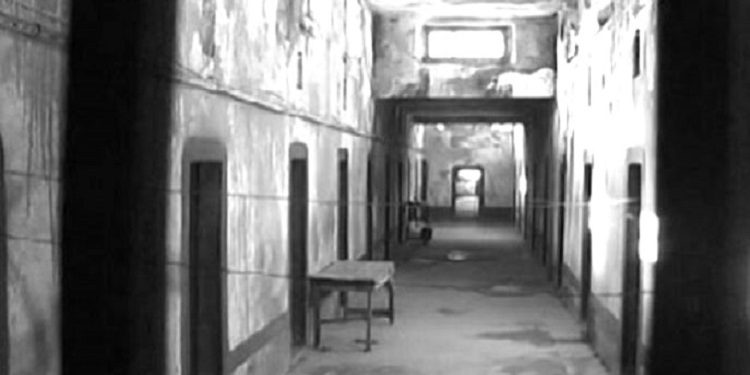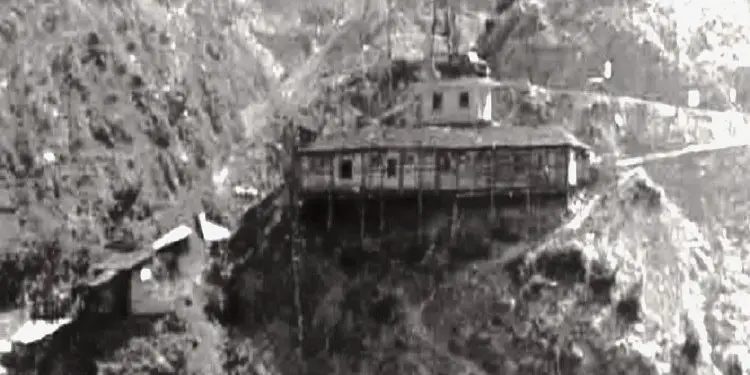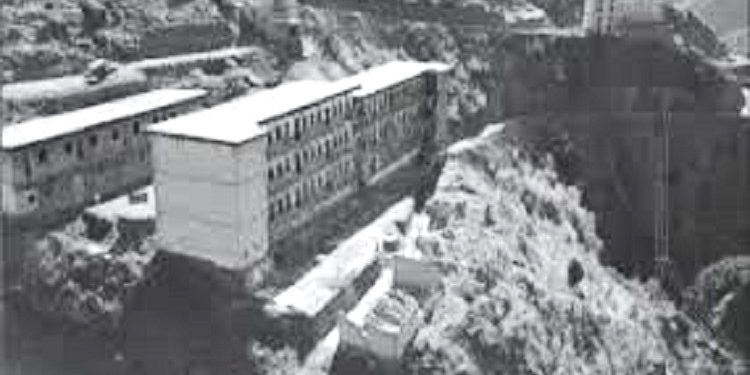By Uran Kalakulla
Part Two
Nazism and Communism
Memorie.al / Nazism lasted 12 years, while Stalinism lasted twice as long. In addition to many common characteristics, there are many differences between them. The hypocrisy and demagogy of Stalinism was of a more subtle nature, which was not based on a program that was openly barbaric, like Hitler’s, but on a socialist, progressive, scientific and popular ideology, in the eyes of the workers; an ideology that was like a convenient and comfortable curtain to lie to the working class, to lull the sharpness of intellectuals and rivals in the struggle for power.
One of the consequences of this peculiarity of Stalinism is that the entire Soviet people, its best, capable, hardworking and honest representatives, suffered the most terrible blow. At least 10-15 million Soviets lost their lives in the KGB torture chambers, martyred or executed, as well as in the gulag camps and others like them, camps where it was forbidden to correspond (in fact they were prototypes of the Nazi death camps); in the mines in the ice of Norilsk and Vorkuta, where people died of cold, hunger, from crushing labor in countless construction sites, in the exploitation of forests, in the opening of canals and during transportation in leaded wagons, or in the flooded barns of the death ships.
Continued from the previous issue
My Culture on Prison
In the long course of my readings, what I could call not prison literature, but literature on prison, which this book of mine now also includes, was not left out. The desire to know the world as much as possible pushed me, from a young age, to follow books that talk about human suffering in prison, throughout the history of mankind. And I managed to learn something. But it is a completely different thing to learn about a social phenomenon in books or films, even serious ones, and another thing to experience life in prison on your own, especially a communist prison.
Following the history of human suffering through the centuries step by step, before experiencing such a thing myself, I have tried not to let a book escape me without reading it, when this suffering came to the fore more clearly, whether in real history, in memoirs, or even in artistic literature on the subject of this nature. Thus I learned a great deal about Socrates’ prison, a prison that looked like an ordinary house, the door of which was locked from the outside, and where his disciples would go and stay for hours and days with their master, to persuade him not to drink the cup of poison with which the Athenian court of the Agora had condemned him.
Likewise the infamous prison of the Roman catacombs, where the first Christians were imprisoned, with Peter at the head, the Campanile prison, that of Thomas More, the Spanish Escurial, the Roman and papal Sant’Angelo, the Bastille in Paris, the Milanese prison of Silvio Pellicco, as well as that of the Austrian Spielberg of the Habsburgs, Chernyshevsky’s Petropavlovka or “House of the Living Buried”, of Dostoevsky, the Bari prison of Antonio Gramsci, the Berlin Moabit of Dimitrov and, finally, the American one of Eugene Denis, the general secretary of the American Communist Party, whom counterintelligence had caught red-handed as an agent of the Soviet KGB.
I had also read Haki Stërmilli’s “Prison” and I knew about the imprisonment of Qemal Stafa and his internment in Paftal in Berat, as well as about the fascist prisons and the internments on the island of Ventotene, where both Italian and Albanian anti-fascists were imprisoned. But today, after my experience and that of my fellow sufferers in the communist prison, which fell to us, I cannot fail to mention some typical cases among these aforementioned prisons, comparing them with my prison and that of my friends, that is, between the pre-communist prison and the communist one, so that our reader can draw the right conclusions for himself.
In his work on prison, entitled “My Prisons”, Silvio Pelico, from the first pages, when he was still in the investigation, in Milan, tells how in the cell where he was locked up (and it was not a cell at all, but a regular room, with the necessary amenities), he tells how the guard not only brought him all the goodies that the arrested person asked for (even with his own money), but also stayed for hours to keep him company so that he would not get bored, addressing him as “sir”, even ordering him not to communicate with the other prisoners of that prison, that they were ordinary people and it was not at all fitting for him to deal with them…! And, therefore, Silvio Pelico was a member of a revolutionary and militant organization, like that of Mazini, which had undertaken the armed struggle against the Austrian occupier, at the time of the Risorgimento, for the liberation and independence of Italy, as actually happened.
Lenin, in his dungeon in the Petropavlovsk fortress, received entire baskets of books from his family and friends on order, he had a bed like at home, with a mattress, sheets, a writing table, and they brought him as much food as he wanted. And for his revolutionary activity, the tsarist court sentenced him to only 14 months of solitary confinement and three years of exile in Siberia, where he lived in a good house, where he took his wife, Krupskaya, with him; where he had plenty of books, and where he wrote one of his famous works there; he had the right to roam the entire governorate of the country, without stepping on a thorn. He even had couples and hunting dogs, and so on. And when he himself came to power, it is known how he then treated his opponents. And this is not what I say, but his official communist biographies themselves.
Antonio Gramsci, the founder and chairman of the Italian Communist Party, in the fascist prison of Bari, wrote to a former friend of his, who at that time was working as a diplomat in Mussolini’s Italian embassy in Nazi Berlin, and asked him for original books by Marx, because he did not like the ones published in Moscow, because he had apparently seen “corrections” in them. And his friend sent them from Berlin directly to the prison and the prison police handed them over to him, without opening them.
The university student of Padua, the Albanian Muzafer Pipa, was arrested by Mussolini’s fascist government in April 1939, because he, together with his fellow students, in protest against the occupation of our homeland, started singing the patriotic song, at the top of his voice, in a cafe right in the city center: “Vlora, Vlora …/ may your hand be blessed!” And then they exiled him to the infamous island of Ventotene, but they allowed him to return to the university to take his final exams and receive his law degree. And when the graduate returned to his homeland, they appointed him a judge, despite the fact that Muzaferi refused and became only a lawyer. Qemal Stafa, who was still in the political prison of Tirana (the old prison), when his brother, Veliu, died, the government of King Zog allowed him to leave prison and go to his house for a few days to get used to the necessary habits.
While I, who had already been released from prison and was in exile with my whole family, in a remote village in Kavaja, within six months my mother and sister died in Tirana and I was not allowed to go to their funeral, although the regulations of the Ministry of the Interior clearly stated that in such cases, the internee had the right to leave with special permission.
My older sister, who was my sister, was caught red-handed by the fascist police, distributing anti-fascist tracts on a street in Tirana. The Italian driver of the car that was taking her to prison hid the tracts from her, so that nothing was found on her body during the search. And the military court sentenced her to three months of house arrest, so that she could not go out into the center. But after a week, she came out again, as if nothing had happened!
Ali Kelmendi, the Comintern envoy to Albania, was caught by King Zog’s gendarmerie with evidence, but he was not imprisoned and was isolated only in Gjirokastra, where he was given a gold franc every day, when the pickaxe worker received I don’t know if he got 3 ALL a day at that time (1 franc was 5 ALL). Then, when he fell ill, he allowed him to flee to France, where he died.
Likewise, two active members of the Korça Communist Group, Koçi Xoxen and Pandi Kriston, were “exiled” by Zog’s government to Peshkopi and given 1 gold franc a day. And they were making fun all day long, even cursing the government and making communist propaganda. I believe there is no need to go any further to bring other facts.
The state-prison of the party-state
The state and the prison are historically inseparable, like a fatality, like an inevitable symbiosis of all human history.
The state is the master; the prison is the policeman who guards this master, as a dog guards the master of the house. Of course, along with the policeman, the spy and the executioner also enter. It is known that the spy “watches”, guards harder and deeper than the policeman, then it is the latter who himself kidnaps the guilty or the opponent and hands them over to the executioner who, to put it mildly, can be called an investigator or a judge. And it is the tails of these that then put an end to the drama, that is, the executioners who execute the decision, or who slowly take the soul of the condemned.
When the state is called a democracy and man is not monitored and punished for his thoughts, for his peaceful protests, the state sleeps somewhat more peacefully and the prison grinds only a few wild heads, with sour brains and animalistic souls, who tend to bite not just the state, but more different citizens, to rob or kill them, as executioners, under someone else’s salary, or as rapists of women and children. And then the violence of the state on these savages with a human face is not only right, but necessary, as a matter of public hygiene.
But when the state is called a dictatorship, and especially a communist dictatorship, then the state is in the role of the criminal, and the police, the investigator, the judge, the executioner, are nothing more than gears whose duty is to grind the flesh, bones, and squeeze the blood of the condemned, to serve as food to the monster called the dictator and those who are close to him, in his direct service, always obedient and servile, whose first duty is to glorify cannibalism.
Thus, under a dictatorship, and especially a communist one, the prison turns into a kind of huge mill, which grinds a good part of the people turned into slaves and which serves, for the rest, as a gogol, to scare them into sleep at night. In our century, among the bloodiest in human history, as if from the depths of hell, three monsters emerged onto the surface of the earth, as ugly and huge as they were, as dangerous and bloody. And they rained on the European continent, that is, in the heart of the world, in the hearth of culture since ancient times that which truly painfully managed to raise, in the end, the foundations of democracy and humanism.
One of these monsters was Italian fascism, which tried to dismantle ancient Albanian, but more as a caricature, as a farce, than as a mentality, although it had the appetite of a glutton. A big appetite, but small heels. The second monster emerged from the darkness of the Black Forest, like a ghost of the Teutonic tribal skulks, with wild bull horns on his head, clad entirely in steel, with sharp and ever-curling teeth like those of a panther, with the great fever of bloodsucking in his bestial heart. And this monster was German Nazism!
But even earlier than the first two, it emerged from the depths of the Siberian taigas, with mixed Russian and Kalmyk blood, a slave of the time of Herodotus, a scoundrel and a lice-eater, with his head covered with a caftan and a beard down to his waist, like a priest of the Shcheves, armed in one hand with a sickle and in the other a skull-crushing hammer, both to suck the blood of his victims and to smash their brains. And this monster was Russian Bolshevism!
Oh great God, what ugliness and savagery our twentieth century has brought to light! And before you know it, this ghastly fate befell our small and so long-suffering Albania, just when it had just begun to somehow raise its head in the sunlight, to heal the wounds of the two thousand year old past and to walk on the path of peace and progress with the light of the flag of Skanderbeg in its eyes. And longer, deeper, more radically damaged, small Albania, carried Bolshevism on its back with an even more ridiculous and ugly name, the name; “enverism”. Here, this was, in essence, the prison state of the party-state.
Bitter laughter!
In the pages of this book the reader will also encounter sorrows of humor, of laughter. They seem like a flagrant contradiction with reality, with the environment, with prison life. But don’t rush. Even in prison there was a kind of life, which was more than that, it was, in fact, vegetation, a kind of survival, as long as the unfortunate people there still managed to breathe. A scholar has said that; laughter is survival; it is health of the body and soul. But there is laughter and laughter.
The laughter of a child is like a flower that bursts into bloom, like the chirping of a bird in spring, rejoicing in the warm season after the winter frost. The laughter of a mother is the continuation of the laughter of a child when she rejoices in its birth, growth, and flowering. The laughter of a mature man contains within itself a mockery of vice and the caricature of life. The laughter of an old man, on the contrary, contains within itself a kind of reproach, a kind of irony, sometimes cynical, for the ugliness and vanity of society and of human nature itself. What about the laughter of a prison? It is close to that of an old man, but deeper, more cynical, closer to sarcasm, if not sarcasm itself. And everyone knows that sarcasm is bitter, bitter laughter. Whoever wants to be strongly led to laughter, if he wants, let him read the book with the same title by the French philosopher, Henri Bergson.
Laughter in prison resembles a tragicomedy. And if we compare comedy with the color white and tragedy with black, it is known that their mixture gives brown, that gray that has the nuances of sadness and pessimism of the soul. The French “damned poets” such as Paul Verlaine, Arthur Rimbaud, etc. belong to this theme. But the laughter of prison surpasses, in its sadness, even the sadness of these damned poets. Because it is born in a place a thousand times sadder than the bohemian life of the aforementioned poets. It is born in prison cells, in the galleries of mines, in the prison huts of Burrel, under the policeman’s boot and under the snake eye of the operative. It is born in the gloomy darkness, like the darkness of hell, of the communist dictatorship.
The truth is, to laugh in sadness, to laugh in oil, for me is not weakness at all, nor stupidity, on the contrary, it is manliness. There have been men who, even when they were taken to be hanged or shot, have put their lips to the gas and said to death; loot. What kind of gas this is, let the reader find out for himself, so do not be surprised at all if, in the pages of my book about the world of sadness, mourning and horror, you will find, from time to time, a ray of light, a sound of laughter, a speck of joy. And the laughter in prison was caused by caricatures that had only the human silhouette, whether these were prisoners or policemen of various ranks or ranks.
Historical Fatality
The birth of communism was, without a doubt, a historical fatality, especially the Bolshevik Revolution of October 1917, which brought to power the most extreme and cruel variant of this theory, a variant that, as was proven on the world stage, instead of leading the broad and poor masses of the peoples towards the promised freedom and well-being, plunged them even worse into misery, into poverty, into a real slavery, into the discourse of mass, state crime.
There is a fundamental difference between classical Marxism and Bolshevism. The state of Marxism would not be peasant Russia at all, but England, Germany, France, where it was known that there was a much more developed working class, even numerically, and the European leaders did not have the cynical and criminal spirit of the Russian Bolsheviks. It has been said that Russian Bolshevism, although in theory it was based on European, therefore Marxist, thought, in practice it had the Asian spirit. The bestial Russian of the Russian steppe as well as the sophisticated and diabolical Asian, Sino-Mongolian torture.
I am convinced that if Marx and Engels had continued to live in the Soviet republic of Lenin and, especially, Stalin, they would definitely have ended up being shot by the squads of Dzerzhinsky’s Cheka, as enemies of the Bolshevik revolution. Why, did not Plekhanov, the father of Russian Marxism, die isolated and indignant in 1919, after seeing the horror with his own eyes and uttering that famous phrase: “Lenin is crazy”? And if he had continued to live under Stalin, would he have found everything? Would he not have suffered like Zinoviev, Kamenev, Trotsky, Bukharin and their friends?
No, it was neither Kautsky nor Liebknecht, nor even Rosa Luxemburg, the true revisionists of classical Marxism, but it was Lenin himself, first, and then Stalin, supposedly this “faithful disciple” of Lenin. And so on, from these to their disciples, and in other countries where this evil seed triumphed: Maoism, Ho Chi Minhism, Kimersenism, Pol Potism, Castroism, Ceausescuism, up to Titoism and finally to Enverism!
Whoever wants to clarify himself further theoretically, let him read, if he wants, just a book by Karl Kautsky, entitled “Communism and Terrorism”, to see how the classical German Marxist treats both Jacobin terrorism and Bolshevik terrorism, denigrating the latter even worse. Recently, a rather voluminous book has been published in Western Europe and, if I am not mistaken, in the USA, with the significant title “The Black Book of Communism”, by about six authors: French, Polish, and Hungarian. With facts, documents, statistics, photos, that book analyzes and chronicles, exposing the communist plague, from the Soviet Union to where this evil seed became a state system, in Europe, Asia, Africa and Latin America.
That book even includes Albania during Hoxha’s time, known, unfortunately, little and inaccurately, due to a lack of information; another unfortunate oblivion and discrimination for our long-suffering country…! I, who speak like this, have never been a Marxist. On the contrary, I am and will die an anti-Marxist, for many reasons. But I want to emphasize that if I were to write a divine comedy following the example of the great Florentine, I would leave Marx on the threshold of hell, if not in purgatory, like the scholars of classical antiquity, who were pagans (since Dante, as is known, was a convinced Catholic), while Bolshevism, of any kind of communist variant, would have been put in hell, beyond the ninth circle, in the pit of Lucifer, if not even deeper!
In this regard, I am convinced that, if the Bolshevik Revolution had not triumphed in Russia in 1917, not only would the millions of victims there have been spared, from that year until 1990, but Russia would have developed on the path of democracy like the countries of Western Europe, and why not even like America. Likewise, if in our small and very unfortunate Albania, Hoxhaism had not come to power, our country today would have long been in the United Europe, even before Greece, and would have given loans and aid to the Balkan countries, while at the same time giving them the norms of Western democracy, and without any chauvinistic intention in the framework of “integral pan-Orthodoxism”, when it is well known, now even by foreigners, that we Albanians have historically been and continue to be for the complete liberalization of religions, for harmony between them and without any tendency of sick nationalism, which degenerates into Serbian-type chauvinism! Memorie.al












![“The ensemble, led by saxophonist M. Murthi, violinist M. Tare, [with] S. Reka on accordion and piano, [and] saxophonist S. Selmani, were…”/ The unknown history of the “Dajti” orchestra during the communist regime.](https://memorie.al/wp-content/uploads/2026/02/admin-ajax-3-350x250.jpg)
![“In an attempt to rescue one another, 10 workers were poisoned, but besides the brigadier, [another] 6 also died…”/ The secret document of June 11, 1979, is revealed, regarding the deaths of 6 employees at the Metallurgy Plant.](https://memorie.al/wp-content/uploads/2026/02/maxresdefault-350x250.jpg)


